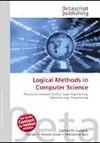Impure Simplicial Complexes: Complete Axiomatization
IF 1
4区 数学
Q4 COMPUTER SCIENCE, THEORY & METHODS
引用次数: 0
Abstract
Combinatorial topology is used in distributed computing to model concurrency and asynchrony. The basic structure in combinatorial topology is the simplicial complex, a collection of subsets called simplices of a set of vertices, closed under containment. Pure simplicial complexes describe message passing in asynchronous systems where all processes (agents) are alive, whereas impure simplicial complexes describe message passing in synchronous systems where processes may be dead (have crashed). Properties of impure simplicial complexes can be described in a three-valued multi-agent epistemic logic where the third value represents formulae that are undefined, e.g., the knowledge and local propositions of dead agents. In this work we present an axiomatization for the logic of the class of impure complexes and show soundness and completeness. The completeness proof involves the novel construction of the canonical simplicial model and requires a careful manipulation of undefined formulae.不纯单纯复合体:完全公理化
在分布式计算中使用组合拓扑来建模并发性和异步性。组合拓扑的基本结构是简单复合体,它是一组顶点的子集的集合,被称为简单体,封闭在容器下。纯简单复合描述异步系统中的消息传递,其中所有进程(代理)都是活动的,而非纯简单复合描述同步系统中的消息传递,其中进程可能已死亡(已崩溃)。非纯简单复合体的性质可以用三值多智能体认知逻辑来描述,其中第三值表示未定义的公式,例如,死亡智能体的知识和局部命题。在这项工作中,我们提出了一类不纯复合体逻辑的公理化,并显示了健全性和完备性。完备性证明涉及正则简化模型的新构造,并要求对未定义公式进行仔细的处理。
本文章由计算机程序翻译,如有差异,请以英文原文为准。
求助全文
约1分钟内获得全文
求助全文
来源期刊

Logical Methods in Computer Science
工程技术-计算机:理论方法
CiteScore
1.80
自引率
0.00%
发文量
105
审稿时长
6-12 weeks
期刊介绍:
Logical Methods in Computer Science is a fully refereed, open access, free, electronic journal. It welcomes papers on theoretical and practical areas in computer science involving logical methods, taken in a broad sense; some particular areas within its scope are listed below. Papers are refereed in the traditional way, with two or more referees per paper. Copyright is retained by the author.
Topics of Logical Methods in Computer Science:
Algebraic methods
Automata and logic
Automated deduction
Categorical models and logic
Coalgebraic methods
Computability and Logic
Computer-aided verification
Concurrency theory
Constraint programming
Cyber-physical systems
Database theory
Defeasible reasoning
Domain theory
Emerging topics: Computational systems in biology
Emerging topics: Quantum computation and logic
Finite model theory
Formalized mathematics
Functional programming and lambda calculus
Inductive logic and learning
Interactive proof checking
Logic and algorithms
Logic and complexity
Logic and games
Logic and probability
Logic for knowledge representation
Logic programming
Logics of programs
Modal and temporal logics
Program analysis and type checking
Program development and specification
Proof complexity
Real time and hybrid systems
Reasoning about actions and planning
Satisfiability
Security
Semantics of programming languages
Term rewriting and equational logic
Type theory and constructive mathematics.
 求助内容:
求助内容: 应助结果提醒方式:
应助结果提醒方式:


